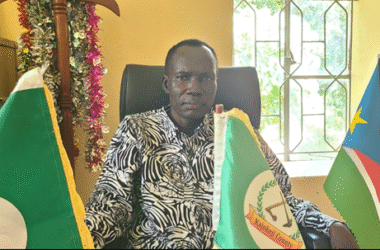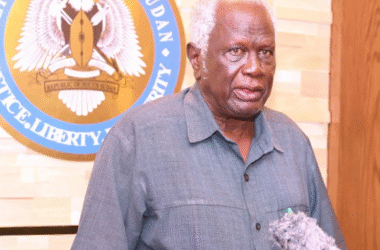By Yiep Joseph
Ministry of Environment and Forestry has remained steadfast in implementing plastic environmental fees, despite concerns raised by the South Sudan Manufacturers Association (ASSM).
In a press conference on Monday, Joseph Africano Bartel, Undersecretary at the Ministry of Environment and Forestry, expressed disappointment with online complaints from certain members of the Manufacturers Association, on behalf of water bottling factories.
Bartel emphasized that the fees are crucial for environmental protection and sustainable waste management.
He stated that the Ministry is committed to working with stakeholders, including the ASSM, to address any legitimate concerns while ensuring the successful implementation of the policy.
Separately, Adam Kubanja, Chairperson of the ASSM, claimed that water bottling factories were facing potential shutdowns due to a shortage of preforms, the raw materials used to manufacture plastic bottles.
Kubanja attributed this shortage to taxes imposed by PLASCOM, the implementing agent of the Ministry’s environmental fees policy, on plastic imports.
The ASSM has called for a review of the policy, arguing that the current implementation is negatively impacting local businesses and hindering economic growth.
“The policy states that for every single plastic item, the Ministry collects a fee of $0.01 for a 600ml bottle and $0.02 for bottles ranging from 600ml to 1.5 liters. When accumulated, this amount becomes a significant financial burden that is unbearable for us,” he explained.
He urged the government, particularly the Ministry of Environment and Forestry, to reconsider the taxes, noting that they are substantial for water factories and could increase market prices.
In response, Undersecretary Bartel stated that most water factories had agreed to the policy imposing environmental fees on plastics and had cleared their preforms at the border.
He emphasized that these fees are intended to protect the South Sudan wetlands and rivers from plastic pollution.
“We appealed to water bottling factories to develop environmental fees that are globally accepted; such fees for any polluting materials are standard,” he said.
He refuted the claims made by the Manufacturers Association and asserted that no water factory has threatened to close down due to the environmental fees.
Mr. Monday reiterated that the Ministry of Environment is committed to protecting the environment from pollution.
“Our goal is to ensure that we have a clean environment and to curb plastic pollution,” he stated.
He added that this year, through the budget appropriation bill, the ministry had established an environmental fee of 30 South Sudanese Pounds (SSP) for 500 ml bottles, adjusting to 1 cent due to fluctuations in currency value.
The Undersecretary emphasized that the Ministry of Environment and Forestry will not permit companies to pollute the environment.
“Anyone who thinks that 1 cent will ruin their business should find another country to operate in,” he said. “Any water bottling factory that closes because of the environmental fee will not be allowed to operate and pollute our environment.”
He highlighted that plastic bottle pollution has reached a critical level in the country, with rivers, streams, streets, and wetlands littered with plastic debris.
The Undersecretary estimated that over one trillion plastic bottles are polluting the environment.
“To address and clean up our environment from this severe plastic pollution, the Ministry of Environment and Forestry has imposed a fee on plastic bottles. This fee serves as a deposit for buying back bottles for safe disposal and recycling,” he explained.
“The ministry urges cooperation from water factories and appreciates those companies that have already complied with the payment of these environmental fees,” he added.
In 2024, Simon Akuei Deng, Chairperson of the South Sudan Revenue Authority (SSRA), encouraged both local and international businesses to comply with the new Financial Act for 2024–2025.
He called on the private sector to support the government in financing the budget by paying taxes.
“We need your support as the private sector because no country can function without a strong private sector.
Civil servants and the private sector together encompass the nation we call South Sudan today,” he said while addressing participants during a quality award event in Juba.




